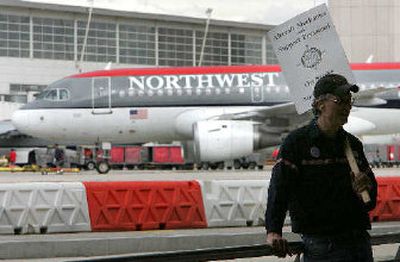Airline plays hardball with union

MINNEAPOLIS — Removing a militant union is something most companies can only dream of. Northwest Airlines Corp. may be on its way toward doing it — and other companies and unions are watching.
Northwest lined up 1,900 replacements to step in when its mechanics, cleaners and custodians walked out over the weekend. It has said they’re temporary, that it still wants a deal with the union. But if it hires permanent replacements, Northwest could end up setting an example that other companies would be tempted to follow.
The mechanics’ strike entered its fourth day Tuesday, with no negotiations scheduled between Northwest and the union. The airline and mechanics offered varying reports of the effect on Northwest’s flights, but information screens at the company’s Minneapolis-St. Paul Airport hub showed most flights running on time Tuesday.
“Everyone in the airline industry is watching this,” said Harley Shaiken, a professor at the University of California, Berkeley, who has written extensively on labor issues. “They’re making a very strong point that I suspect other airlines will look at very carefully. It will embolden other airlines and other industries.”
Unions are watching, too. Northwest spent a year and a half preparing for a strike. Besides replacement mechanics, it arranged for replacement flight attendants to guard against a sympathy strike, which didn’t happen. The preparations are “a very clear signal that they’re playing hardball. Northwest means it that way, and the unions certainly view it that way,” Shaiken said.
The Aircraft Mechanics Fraternal Association was an easier target for Northwest than most unions in aviation and elsewhere.
It’s not in the powerful AFL-CIO labor federation. It angered the ground workers in the International Association of Machinists by poaching mechanics away from the IAM in 1998. AMFA also incensed the pilots’ union by refusing to take cuts after pilots accepted concessions. Only flight attendants voted on whether to strike with AMFA — and they rejected it.
An AMFA loss in this strike “would send a signal to the labor movement that solidarity really is critical,” said Thomas A. Kochan, a labor and management professor at the Massachusetts Institute of Technology. “Not only solidarity among the unions involved, but solidarity with the public. The only successful strikes in recent time are ones where the public is sympathetic to the work force.”
He cited a walkout by UPS workers in 1997 and the Justice for Janitors campaign that began during a 1985 janitors strike and grew to other cities. In both cases, efforts to convince the public — not just other union members — that the worker cause was right helped them win.
“For unions the lesson is, going it alone has never been more risky,” Shaiken said.
He sees similarities with the 1981 strike by air traffic controllers — as do mechanics, who invoked the controllers’ union during a mechanics’ rally before the Northwest strike began.
The Professional Air Traffic Controllers Organization was a small, non-AFL-CIO union that believed the specialized skills of air traffic controllers would make them too tough to replace, Shaiken said. But President Reagan fired them during a strike in 1981.
“That really emboldened employers across the spectrum to begin replacing workers far more readily,” Shaiken said.
Eastern Airlines kept flying with replacement workers during a 1989 strike, though it ended up bankrupt and quit flying. During the 1990s Caterpillar Inc. kept running through two strikes with replacement workers.
AMFA “obviously didn’t pay much attention to the Professional Air Traffic Controllers,” he said, who were a “tough union, went on strike, thought their skills would save them. It simply didn’t.”